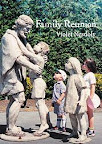When Tina, her country bumpkin mother, bursts upon their little soirée with the embarrassing request that Aglaia take the Bible that Francois left at the farm 15 years ago and return it, Aglaia is beyond humiliated. But the Bible does find its way into her luggage and becomes a magnet once she discovers the notes the French exchange student scribbled in its margins all those years ago.
As she reads them, she is transported back to that summer of young love when she was 17 and sure that Francois’ heart was all hers. She recalls the Greek myths of which the Bible stories they read in youth group reminded him, and finds tucked inside a photo postcard of the Three Graces. The Third Grace, Aglaia, is what Francois called her. That’s why she has not been Mary Grace — the name her parents gave her — for many years.
Much has happened since that crossroads summer at the farm in Nebraska. She has made an impression on the cultural scene in Denver where she works as an up-and-coming costume designer. As far as she’s concerned, her Mennonite past is history despite the longing in her parents’ eyes and their thinly disguised pleas for her help with the farm.
Aglaia’s friend Lou has her own agenda. Their paths get crazily entangled in this story that explores young love, faith, identity, and loyalty to family and friends.
The well-realized characters make The Third Grace a delight. Lou is a devious college prof who we don’t trust from the minute we meet her — though Aglaia wants to and tries to, to our dismay.
Eb, Aglaia’s boss at the costume shop, is an eccentric, wise, father-figure and my personal favorite. His love for the Bible and the Christian classics creates a fine foil for Aglaia's fascination with Greek mythology.
Francois, the charming, lascivious student from the past plays a large role through Aglaia’s memories.
Aglaia’s Mennonite parents ring true, with their homespun sensibilities, their ethnic cuisine, and their Plautdietsch-inflected pronunciations: “trock” and “tanse” for “truck” and “tense,” and Germanisms like “Na jo,” En betje.”
Finally there’s Aglaia herself — talented and ambitious, yet idealistic, wistful, and conflicted in the way she continues to carry the torch for her teenage sweetheart.
Elkink’s writing is a tailored garment of sensuous description, trimmed with just the right words to signal deeper meanings. Note this bit from the opening scene where Aglaia is entertaining Lou in her apartment:
“Aglaia angled her glass and looked into its blood-red interior. Wine was a symbol of communion, she thought, and she was using it with carnal deliberation to seal this relationship that had so much to offer her” p. 12.
Or this snippet describing Aglaia’s relationship with her craft:
“From the time she was a child…she’d hankered to sew. She learned the smell of the flax beneath the linen, savored the variance between silk and wool. She had a habit still of chewing a strand each time she laid out a length of yard goods ready for the shears. She made a sacrament of touching and sniffing and tasting—a sensual adulation” – p. 42.
I wasn’t surprised to learn that Eklink is herself a seamstress and has designed costumes.
I enjoyed this tale for its writing style and literary forays as much as its finely crafted characters. Elkink seems as comfortable recounting Aglaia’s fall from faith and attraction to the occult world of Greek myth as she is describing a scene of teenage infatuation, a Paris bistro, or a child-squirmy kitchen. The story is enriched with quotes from the Bible and Christian luminaries like Saint Augustine, Dante and others through Eb.
For a reading experience as layered and sumptuous as Aglaia’s period costumes, The Third Grace by Deb Elkink won’t disappoint. Could we please have some more?
(I received this book as a gift for the purpose of writing a review.)
Title: The Third Grace
Author: Deb Elkink
Publisher: Greenbrier Book Company, December 2011, paperback, 306 pages
ISBN-10: 1937573001
ISBN-13: 978-1937573003
This review is linked to Saturday Review of Books: January 7, 2012 at Semicolon Blog.


0 comments:
Post a Comment